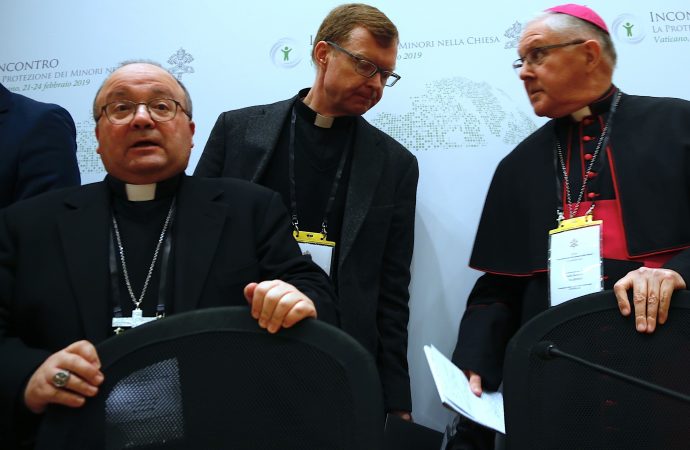German Jesuit Father Hans Zollner is a man on a mission to guarantee the safety of minors within the Catholic Church. This aim, he knows, is a task that will require responsibility, transparency and accountability, and the path forward “will not be an easy ride.”
A psychologist by training, Zollner is a member of the pope’s Commission for the Protection of Minors, the president of the Centre for Child Protection at Rome’s Gregorian University and in 2010 he was a member of the “Round Table on Child Abuse” commissioned by the German government.
For years he’s been traveling the world, training priests, bishops, religious and laity on the protection of minors. Education has long been his main focus, and hence he’s often not one to comment on specific cases.
For instance, on Theodore McCarrick, removed from the priesthood by Francis after the former cardinal was found guilty of sexually abusing minors, Zollner simply said, “It’s my understanding that [the Vatican] is working on the release of some information, some kind of documentation, of what can be said with regards to this topic.”
Cardinal Sean O’Malley of Boston, who leads the papal commission on minors, went further at a press conference on Friday, when he said he wants to see a report from the Vatican detailing who knew what and when about McCarrick. He also said he believes that report will include information sent to the Holy See by the four dioceses where McCarrick served, meaning New York, Metuchen, Newark and Washington, D.C.
Zollner was also one of the four churchmen tapped by Pope Francis to organize the Feb. 21-24 Vatican “Meeting on the Protection of Minors in the Church,” often described more simply as the pope’s “anti-abuse summit.”
The summit “fulfilled my expectations to some degree, because we came to the point of what I would consider the most important outcome: I saw, I felt, and people spoke to me, that they have been transformed by these three days and this very intense experience,” he told Crux on Tuesday.
After the four-day gathering, Zollner is convinced that those places around the world where the Catholic Church has yet not “dealt with these issues in a prominent way” will “do so now.”
Such a global approach was the key expectation set by Francis in advance of the summit.
Speaking with journalists on his way back from Panama in January, he said the meeting would guarantee that the entire Church, represented by 114 presidents of bishops’ conferences, heads of Eastern Churches in communion with Rome and bishops of missionary territories, together with the heads of the male and female religious orders, is on the same page.
According to Zollner, following the summit “we need clarity about the three things that we have spoken about: Responsibility, accountability and transparency.”
Particularly in the area of accountability, “we’ll need to work on the ideas and models that were proposed, which would include theology and canon law and go to the very core of the Church’s structure.”
“I do not expect that this will be an easy ride, because there are many traditional expectations that [could affect] ecumenical relationships, for example with the Orthodox churches,” he said. “But we expect this clarification of what happens when a single bishop does not comply with guidelines and canon law.”
On Sunday, closing the summit, Italian Father Federico Lombardi, a former Vatican spokesman, told reporters at a press conference that there would be three concrete outcomes of the gathering, to be realized “in the near future.”
These are guidelines on how to act when a case of abuse is reported in Vatican City State, a second is a vademecum, or “handbook,” for bishops on how to respond when they are presented with an allegation against a member of the Church, and also a set of regional task forces to assist bishops’ conferences and individual bishops in implementing anti-abuse protocols.
The summit’s organizing committee met on Monday with the heads of various Vatican offices to begin discussing the follow-up. Zollner said he couldn’t put a timeline on when each thing will come out.
“I’m not the one who drafts papers or laws,” he said, adding that some will “come out very soon, others will take a few months, but no more.”
As the priest noted, specialists are needed, particularly in the field of canon law who interact with civil lawyers and are “knowledgeable of the legal situation of the state in which they live, because in some places it’s not clear at all what one is supposed to do when it comes for example to reporting [crimes to civil authorities] or the duty of an institution regarding the follow-up after imprisonment and so forth.”
“There are a lot of things that need proper attention and people who are experts should help the bishops’ conferences, especially those that are more in need to develop their guidelines and to implement them,” he said.

